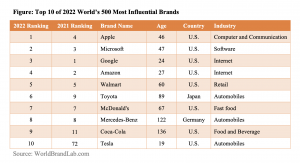NEW YORK, US, December 14, 2022 /EINPresswire.com/ -- The 2022 World's 500 Most Influential Brands (19th edition) list—compiled by World Brand Lab—was released on December 14 in New York. Apple, Microsoft and Google claimed the list’s top three slots. The U.S. has the most representation, followed by France, Japan, China and the U.K.
Dr. Steve Woolgar, Chairman of the
Companies from the United States represent 198 out of the top 500 brands, retaining influence as the global brand superpower. France, Japan, China and the U.K. comprise the second most influential global camp. However, the number of Chinese brands selected (45) has surpassed that of the U.K. (35). These brands from China include State Grid, Haier, China Resources, China Life, Wuliangye, Tsingtao Beer, Chow Tai Fook, Sinochem, China Southern Power Grid, Hengli, XCMG and Beidahuang. Finally, Germany, Switzerland, and Italy comprise the third tier of brand powerhouses, with 28, 18 and 15 selected brands, respectively. Thus, even though the European economy is experiencing economic recession and social unrest due to geopolitical risks and the energy crisis, the brands of European countries remain robust.
The World's 500 Most Influential Brands, published for 19 consecutive years, is judged on the basis of a brand's global influence. Brand influence refers to a brand’s ability to develop and capture markets and make profits. Brand influence refers to a brand's ability to develop markets, capture markets and make profits. Following three key indicators of brand influence, namely market share, brand loyalty and global leadership, World Brand Lab tracked more than 15,000 leading brands around the globe to pioneer the World's 500 Most Influential Brands list. When measuring brand loyalty, iTrust Rating’s data were consulted. SuperFinance's ESG database was referred to when measuring brand leadership, especially ESG performance.
An empirical study by a joint team from World Brand Lab and SuperFinance found that the relationship between brand value and ESG performance is becoming more substantial, and B2C brands are more dependent on ESG performance than B2B brands. The 2022 Brands list spans 47 industries: the food industry has 36 brands, surpassing that of the automobile industry, which has 33 brands. The retail industry, previously severely affected by the pandemic, recovered and achieved 27 brands on the list this year. The energy and media industry is tied with 26 brands on the list. Finally, other top industries in terms of the number of entries include the Internet (24), banking (24) and telecommunications (22).
A total of 24 brands are new to the list this year. The highest-ranked brand is TSMC, in 117th place. The brand has customers worldwide, and its chips are used in many end markets. Notable brands, such as AstraZeneca, Japan Post and Quaker, are also listed this year. Hong Kong jewelry brand Chow Tai Fook, which uses the global market to drive brand development, also earned a spot for the first time this year. However, in the context of the global economic downturn, brands in sectors like airlines, automobiles and parts, clothing and apparel, and the Internet became losers, with Air France, PayPal, and Gap falling significantly in the rankings. SoftBank and LINE even dropped off the list.
The average age of the listed brands is 98.22 years. The list includes 222 time-honored brands that are at least a century old, with 40% of these hailing from the US. The French brand Saint-Gobain remains the oldest brand on the list at 357 years old, while Aviva and Moutai also have more than 300-year histories. Among the 45 Chinese brands, Moutai, Tsingtao Brewery, Wuliangye, Bank of China and AIA have been in business for more than 100 years.
According to Dr. Pierre Chandon, professor of marketing at INSEAD, who will attend the World Executive Summit and the release event of the brand list on December 20, "Co-branding is a strategy for brands from emerging markets to enter developed markets. Different from co-marketing and cross-merchandising, where the two brands stay separate, co-branding is when two brands come together and create a new product that did not exist before and would not exist without co-branding. Partnering with a winner is a great start to raising overseas brand awareness."
Likewise, to Dr. Jennifer Aaker, a professor of marketing at Stanford Graduate School of Business, developing storytelling skills is essential in creating a solid brand image for consumers. Stories connect us to meaning, extract meaning and communicate meaning. In addition, changing global trends have ushered in a dramatic shift in branding from viewing customers as just clients or consumers to viewing more of them as collaborators.
Dr. Haisen Ding, CEO of World Executive Group and the World Brand Lab, believes that in the age of globalization and digitalization, strong brands are supported by an invisible reputation ecosystem. Collaboration with stakeholders is therefore a shortcut to brand success.
Adi Ignatius, Editor-in-Chief of Harvard Business Review, outlined that adaptive brands are the most enduring and create a framework to achieve that endurance. Besides, brands need to have memorable stories that connect with consumer groups and lead pop culture.
Since 2003, World Brand Lab has tracked more than 80,000 major brands in 60 countries. This leading brand consulting, research and evaluation firm, which was co-founded and first chaired by the late Professor Robert Mundell, the 1999 Nobel Laureate in Economics, is wholly owned by the World Executive Group.


No comments:
Post a Comment